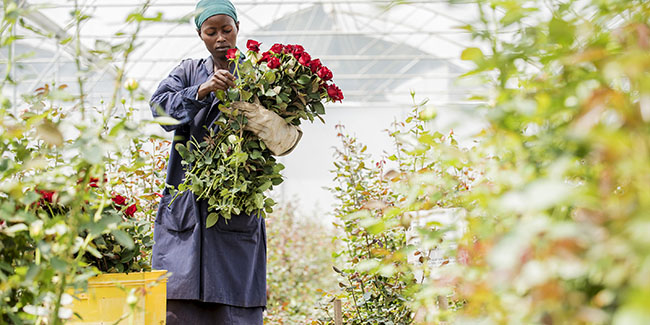By signing the International Responsible Business Conduct Agreement for the floricultural sector, the Dutch floricultural sector joined forces with the Dutch government, a trade union and an NGO to agree on a more responsible approach to international production of and trade in ornamental plants.
Sigrid Kaag, Minister for Foreign Trade and Development Cooperation and Carola Schouten, Minister of Agriculture, Nature and Food Quality, signed the agreement on behalf of the Dutch government. It was signed on behalf of the sector by individual companies, Royal FloraHolland and representative organisations. The agreement ties in with the sector’s existing international Floriculture Sustainability Initiative (FSI). The implementation of the agreement will be – just as FSI – facilitated and chaired by IDH, The Sustainable Trade Initiative.
Joost Oorthuizen, executive director at IDH said: “This is great news for wages, women empowerment & nature in thousands of flower farms around the globe.”
Its first task will be to identify social and environmental risks at sector and company level. Assistance will be provided by the government, the trade union and the NGO. In the first year, projects will be started concerning living wage and the impact of crop protection products on people and the environment.
Wide scope
The scope of the agreement covers the chains for the breeding and production of flower bulbs, parent material, cut flowers, cut foliage, trees and pot and bedding plants. The Netherlands is a major hub in the international floricultural trade. The Netherlands exports flowers and plants worldwide to the tune of EUR 6 billion and imports flowers worth over EUR 600 million from Africa and over EUR 100 million from South America. The main import countries are Kenya, Ethiopia, Ecuador and Colombia. Approximately 600 Dutch trading companies operate internationally.
Why is this agreement necessary?
Companies must endeavor to achieve international responsible business conduct and sustainable supply chain management. This is what society and the government expect. It is also laid down in international guidelines and obligations such as the United Nations Guiding Principles on Business and Human Rights, the Guidelines for Multinational Enterprises issued by the Organisation for Economic Cooperation and Development (OECD) and the core labour standards of the International Labour Organization (ILO). In the Netherlands, IRBC Agreements to this effect have now been made in 10 sectors.
According to IDH reinforces the agreement the international agenda of FSI, and will it speed up the sustainability of the sector. “It is encouraging to see that the covenant is a mix of joint action in due diligence and sector mapping, and also tackles two important themes; living wage and reducing the impact of plant protection products. ”
The IRBC Agreement for the Floricultural Sector is signed by: Minister of Agriculture, Nature and Food Quality – Minister for Foreign Trade and Development Cooperation – AFRI FLORA – Albert Heijn – Dümmen Orange – Dutch Flower Group – Fleura Metz – Floratradeconsult – Royal Lemkes – Waterdrinker – HIVOS – FNV – Royal FloraHolland – Glastuinbouw Nederland – Tuinbranche Nederland – Association of Dutch Flower Wholesalers and Growers. With the support of: Chrysal – Koppert – Max Havelaar – MPS Foundation – The Netherlands Society for Nature and Environment.
The agreement was drawn up after a period of intensive consultation under the auspices of the Social and Economic Council. IDH will facilitate and chair the implementation of the agreement.
